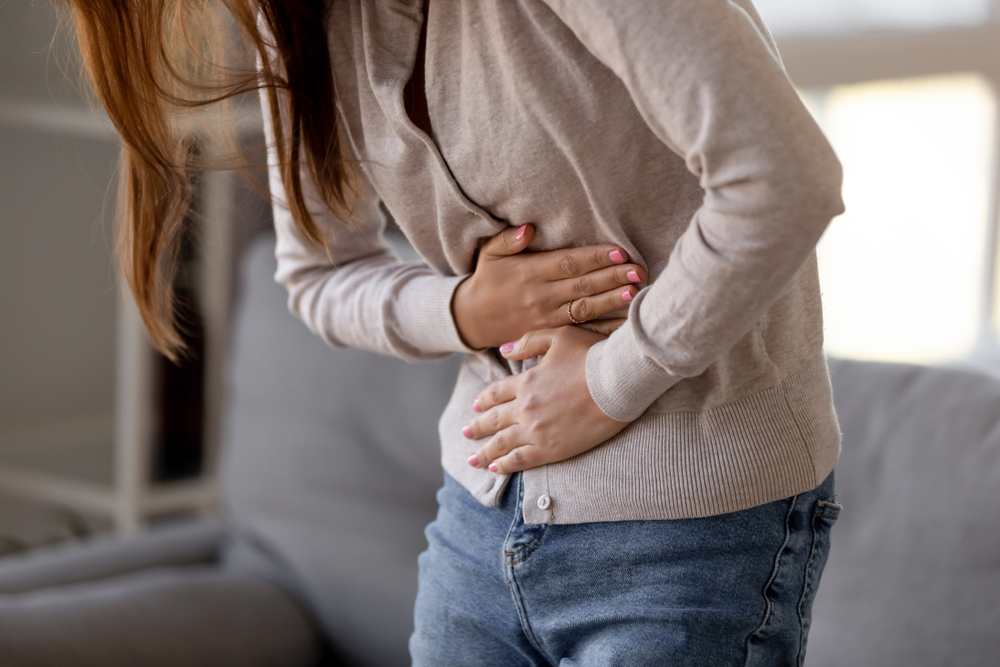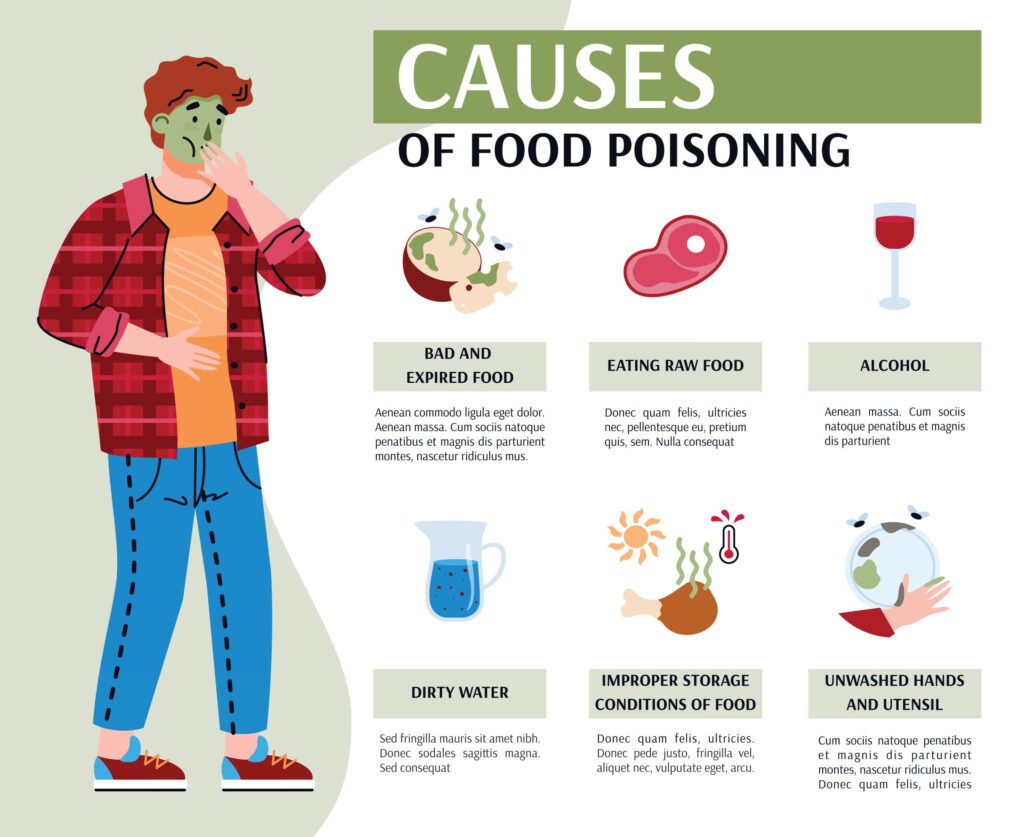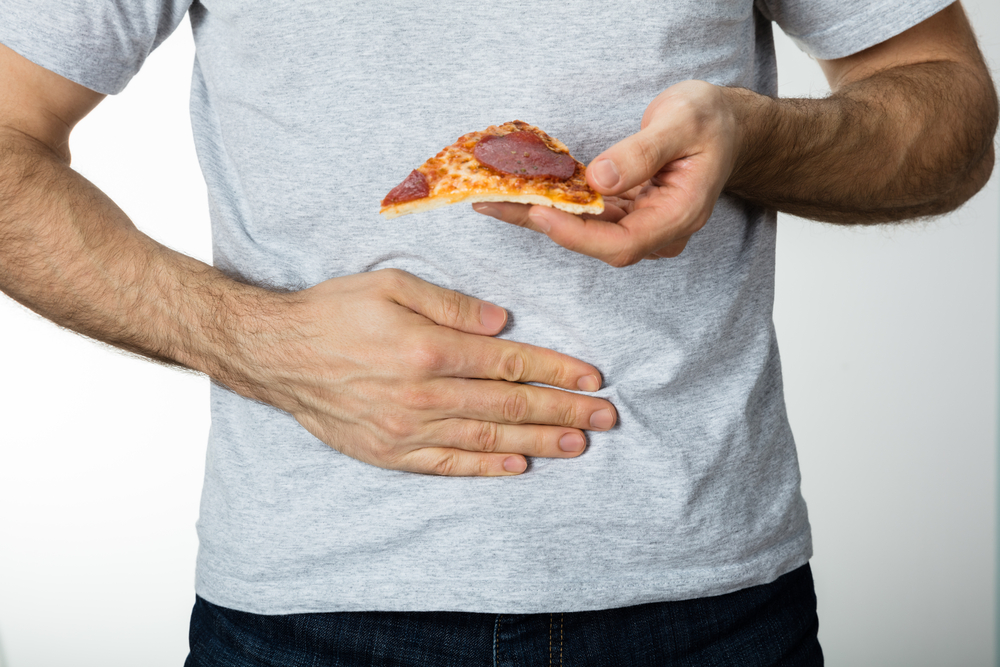Pizza is one of the most consumed foods worldwide, and it is simple to understand why. It is scrumptious, practical, and adaptable to any taste.

However, a lot of individuals are unsure if pizza might make them sick. We shall delve into the question of whether pizza can cause food illness in this post.
A prevalent ailment that annually affects millions of people is food poisoning. It is brought on by ingesting food tainted with pathogenic bacteria, viruses, or parasites.
Food poisoning can cause nausea, vomiting, diarrhea, fever, and stomach pain, which can range in severity from moderate to severe.
Pizza is frequently linked to food poisoning, but is this actually the case? Pizza can cause food sickness, however, this is a rather uncommon occurrence.
The quality of the ingredients, the method of preparation, and the storage conditions all affect the likelihood of contracting an illness after eating pizza.
In general, there is little chance of getting sick if you purchase pizza from a reputable restaurant.
However, you can be putting yourself in danger if you cook your own pizza at home without according to the correct food safety procedures.
What is Food Poisoning?
Food poisoning is a type of foodborne illness that occurs when we consume contaminated food or beverages. The contamination can be caused by bacteria, viruses, parasites, or toxins produced by these microorganisms.

The symptoms of food poisoning can vary depending on the type of contamination and the severity of the illness.
The most common symptoms include nausea, vomiting, diarrhea, stomach cramps, fever, and dehydration.
These symptoms usually start within a few hours or up to several days after consuming the contaminated food or drink.
In most cases, food poisoning is a mild illness that can be treated at home with rest and plenty of fluids.
However, in some cases, food poisoning can lead to severe illness and complications, especially in vulnerable populations such as young children, pregnant women, and the elderly. In rare cases, food poisoning can even lead to death.
It is important to note that not all cases of stomach upset after consuming pizza are due to food poisoning. Other factors such as overeating, food allergies, or sensitivity to certain ingredients can also cause similar symptoms.
If you suspect you have food poisoning, it is recommended to seek medical attention, especially if you have severe symptoms or complications.
Common Causes of Food Poisoning
Food poisoning can be caused by a variety of factors. In this section, we will discuss the most common causes of food poisoning and how they can be prevented.

Bacteria
Bacteria are one of the most common causes of food poisoning. Some of the most common bacteria that cause food poisoning include E. coli, Listeria, Salmonella, Campylobacter, Clostridium perfringens, and Bacillus cereus.
These bacteria can be found in a variety of foods, including raw meat, poultry, eggs, and unpasteurized milk.
To prevent food poisoning from bacteria, it is important to cook food thoroughly and to practice good food hygiene.
This includes washing your hands before and after handling food, using separate cutting boards for meat and vegetables, and storing food at the appropriate temperature.
Viruses
Viruses are another common cause of food poisoning. Some of the most common viruses that cause food poisoning include Norovirus and Hepatitis A. These viruses can be found in contaminated food or water.
To prevent food poisoning from viruses, it is important to practice good hygiene, including washing your hands before and after handling food and avoiding food that has been exposed to contaminated water.
Toxins
Toxins can also cause food poisoning. Botulinum toxin, for example, can be found in improperly canned foods, while cyanide can be found in improperly prepared cassava.
To prevent food poisoning from toxins, it is important to follow proper canning and cooking procedures and to avoid eating foods that are known to contain toxins.
Parasites
Parasites such as Giardia lamblia, Toxoplasma gondii, Toxocara spp, and Trichinella spiralis can also cause food poisoning. These parasites can be found in contaminated food or water.
To prevent food poisoning from parasites, it is important to practice good food hygiene, including washing your hands before and after handling food and avoiding food that has been exposed to contaminated water.
Chemicals
Chemicals such as pesticides and cleaning chemicals can also cause food poisoning. To prevent food poisoning from chemicals, it is important to follow proper handling and storage procedures for these substances and to avoid eating food that has been exposed to chemicals.
Contaminated Food
Contaminated food can also cause food poisoning. This can occur when food is not handled or stored properly, or when it is exposed to contaminated water or air.
To prevent food poisoning from contaminated food, it is important to practice good food hygiene, including washing your hands before and after handling food, storing food at the appropriate temperature, and avoiding food that has been exposed to contaminated water or air.
Cross-Contamination
Cross-contamination can also cause food poisoning. This occurs when bacteria or other harmful substances are transferred from one food to another.
To prevent cross-contamination, it is important to use separate cutting boards for meat and vegetables, wash your hands before and after handling food, and store food at the appropriate temperature.
Improper Preparation and Storage
Improper preparation and storage can also cause food poisoning. This can occur when food is not cooked or stored at the appropriate temperature.
To prevent food poisoning from improper preparation and storage, it is important to follow proper cooking and storage procedures, including cooking food to the appropriate temperature and storing food in the refrigerator or freezer at the appropriate temperature.
Can You Get Food Poisoning from Pizza?
As much as we love pizza, it’s important to be aware that it can be a source of food poisoning. Pizza can be contaminated with harmful bacteria, viruses, or parasites that can cause illness.

The risk of getting food poisoning from pizza depends on several factors, including the ingredients used, the handling and storage of the pizza, and the cooking temperature.
Here are some of the ways that pizza can cause food poisoning:
- Undercooked dough: Raw or undercooked dough can contain harmful bacteria like Salmonella or E. coli, which can cause food poisoning. It’s important to make sure that the pizza dough is fully cooked before adding toppings and serving.
- Contaminated toppings: Pizza toppings like meat, cheese, and vegetables can also be a source of food poisoning. Meat toppings like sausage, pepperoni, and chicken can contain harmful bacteria if they are not cooked properly. Cheese and vegetables can also be contaminated with harmful bacteria if they are not handled and stored properly.
- Cross-contamination: Cross-contamination can occur when bacteria from one food item is transferred to another. For example, if a pizza is prepared on a surface that was previously used to prepare raw chicken, the pizza can become contaminated with harmful bacteria.
To reduce the risk of food poisoning from pizza, it’s important to follow safe food handling practices. Here are some tips to keep in mind:
- Wash your hands thoroughly before preparing and handling pizza.
- Use separate cutting boards and utensils for raw meat and other ingredients.
- Cook pizza at the recommended temperature and for the recommended time.
- Store pizza at the proper temperature (below 40°F) to prevent bacterial growth.
- If you’re ordering pizza from a restaurant, make sure it’s from a reputable establishment that follows safe food handling practices.
While pizza is a delicious and popular food, it’s important to be aware of the risk of food poisoning.
By following safe food handling practices, you can reduce the risk of getting sick from pizza.
Preventing Food Poisoning
When it comes to preventing food poisoning from pizza, there are several steps we can take to ensure that we are safe from harmful bacteria that can cause illness.

Here are some tips to help you avoid getting sick from pizza:
Handwashing
One of the most important things we can do to prevent food poisoning is to wash our hands thoroughly before and after handling food. This helps to remove any bacteria that may be present on our hands and can be transferred to the food we are preparing.
Cleaning
Keeping our kitchen clean is also essential to prevent food poisoning. We should regularly clean our countertops, cutting boards, and utensils with hot, soapy water to remove any bacteria that may be present.
Cooking
Cooking our pizza thoroughly is also important to kill any bacteria that may be present. We should always follow the cooking instructions provided with our pizza, and use a kitchen thermometer to ensure that the internal temperature of the pizza reaches at least 165°F.
Refrigeration
Refrigeration is also important to prevent food poisoning. We should make sure to store our pizza in the refrigerator if we are not going to eat it immediately and keep our refrigerator at a temperature of 40°F or below to slow the growth of bacteria.
Preparing
When preparing our pizza, we should make sure to use clean utensils and cutting boards, and avoid cross-contamination by keeping raw meats separate from other ingredients.
We should also make sure to wash our hands and any surfaces that come into contact with raw meats.
Leftovers
When storing leftover pizza, we should make sure to store it in an airtight container in the refrigerator and consume it within 3-4 days.
We should also reheat our leftover pizza to an internal temperature of at least 165°F to kill any bacteria that may be present.
By following these tips, we can help to prevent food poisoning from pizza and keep ourselves and our loved ones safe from harmful bacteria.
Symptoms of Food Poisoning from Pizza
When we eat pizza, we expect it to be delicious and satisfying. Unfortunately, sometimes pizza can make us sick.
Food poisoning from pizza can be caused by a variety of bacteria, viruses, or parasites that can contaminate the pizza during preparation, cooking, or storage.
Symptoms of food poisoning from pizza can vary depending on the type of bacteria or virus that caused the infection.
Common symptoms of food poisoning from pizza include:
- Nausea
- Vomiting
- Diarrhea
- Stomach pain
- Fever
- Chills
These symptoms can appear within hours of eating contaminated pizza or they can take up to several days to develop.
The severity of the symptoms can also vary, from mild discomfort to severe illness that requires hospitalization.
Nausea and vomiting are often the first signs of food poisoning from pizza. These symptoms can be caused by the body’s natural defense mechanisms to expel harmful bacteria or viruses from the body.
Diarrhea is another common symptom of food poisoning from pizza. It can be caused by the inflammation of the stomach and intestines due to the infection.
Stomach pain and cramps are also common symptoms of food poisoning from pizza. These symptoms can be caused by the inflammation of the stomach and intestines, as well as the body’s response to the infection.
Fever and chills can also occur in some cases of food poisoning from pizza. These symptoms can be caused by the body’s immune response to the infection.
If you experience any of these symptoms after eating pizza, it is important to seek medical attention. Food poisoning from pizza can be serious, especially for young children, elderly people, and people with weakened immune systems.
Treatment for food poisoning from pizza may include rest, hydration, and medication to manage symptoms. In severe cases, hospitalization may be necessary.
Medical Treatment for Food Poisoning
If you suspect you have food poisoning from pizza, it is important to seek medical treatment as soon as possible. In severe cases, food poisoning can lead to dehydration, organ damage, and even death.
The specific treatment for food poisoning depends on the type of infection you have. If you have a bacterial infection, your doctor may prescribe antibiotics.
However, antibiotics are not effective against viral infections, so treatment for viral infections is typically focused on managing symptoms.
In addition to medical treatment, there are also several things you can do at home to help alleviate symptoms and aid in recovery. These include:
- Staying hydrated by drinking plenty of fluids such as water, clear broths, or electrolyte replacement drinks.
- Eating small, bland meals such as toast, crackers, and bananas.
- Avoiding solid foods, dairy products, caffeine, and alcohol until you feel better.
- Resting and getting plenty of sleep.
It is important to note that while over-the-counter medications such as anti-diarrhea and pain relievers may provide temporary relief, they can also prolong the illness by preventing your body from eliminating the toxins causing the infection.
Overall, the best course of action, if you suspect food poisoning from pizza, is to seek medical treatment and follow your doctor’s advice for managing symptoms and aiding in recovery.
Conclusion
After researching and analyzing the information available, we can confidently say that it is possible to get food poisoning from pizza.
The most common cause of food poisoning from pizza is Salmonella, a bacterial infection that lives in the intestinal tracts of animals.
Transmission occurs due to foods contaminated with zoological feces. All aspects of a pizza can succumb to Salmonella, including the meat, cheese, veggies, and dough.
However, it is important to note that the risk of getting food poisoning from pizza is relatively low if the pizza is prepared and cooked properly.
The pizza should be cooked at a high enough temperature to kill any harmful bacteria. Additionally, it is essential to ensure that the ingredients used are fresh and have been stored correctly.
To avoid getting food poisoning from pizza, we recommend following these tips:
- Choose a reputable pizzeria that has good hygiene practices and a clean kitchen.
- Check the pizza for any signs of spoilage, such as a sour smell, mold, or discoloration.
- Ensure that the pizza is cooked thoroughly, with the cheese melted and the crust crispy.
- Avoid eating pizza that has been left out at room temperature for more than two hours.
- Store leftover pizza in the refrigerator and consume it within three to four days.
By following these tips, you can reduce the risk of getting food poisoning from pizza and enjoy this delicious food without any worries.
However, if you do experience symptoms of food poisoning after eating pizza, such as diarrhea, stomach pain, or vomiting, seek medical attention immediately.







Add comment